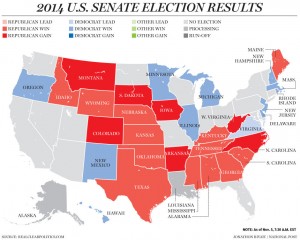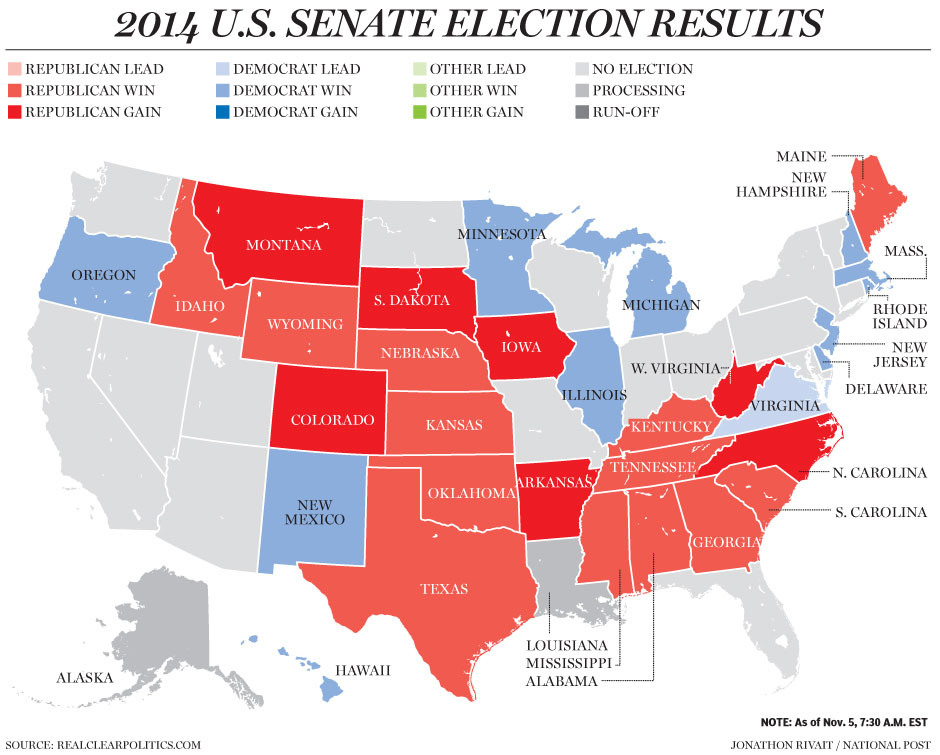by Byron York • The Washington Examiner
 As Democratic losses mounted in Senate races across the country on election night, some liberal commentators clung to the idea that dissatisfied voters were sending a generally anti-incumbent message, and not specifically repudiating Democratic officeholders. But the facts of the election just don’t support that story.
As Democratic losses mounted in Senate races across the country on election night, some liberal commentators clung to the idea that dissatisfied voters were sending a generally anti-incumbent message, and not specifically repudiating Democratic officeholders. But the facts of the election just don’t support that story.
Voters replaced Democratic senators with Republicans in Arkansas, Colorado, Iowa, North Carolina, Montana, South Dakota, West Virginia and likely in Alaska, and appear on track to do so in a runoff next month in Louisiana. At the same time, voters kept Republicans in GOP seats in heavily contested races in Georgia, Kansas and Kentucky. That is at least 10, and as many as a dozen, tough races, without a single Republican seat changing hands. Tuesday’s voting was a wave alright — a very anti-Democratic wave.
In addition to demolishing the claim of bipartisan anti-incumbent sentiment, voters also exposed as myths five other ideas dear to the hearts of Democrats in the last few months:
1) The election wouldn’t be a referendum on President Obama. “Barack Obama was on the ballot in 2012 and in 2008,” Democratic National Committee Chairwoman Debbie Wasserman Schultz said in late October. “The candidates that are on the ballot are Democratic and Republican candidates for Congress.” Of course, that was true, but Republicans from New Hampshire to Alaska worked tirelessly to put the president figuratively on the ballot. And they succeeded.
Every day on the stump, Republican candidates pressed the point that their Democratic opponents voted for the Obama agenda nearly all the time. “Kay Hagan has voted for President Obama’s failed partisan agenda 95 percent of the time,” said Thom Tillis, who defeated the incumbent Democrat in North Carolina. Mark Pryor “votes with Barack Obama 93 percent of the time,” said Tom Cotton, who defeated the incumbent Democrat in Arkansas. “Mark Udall has voted with [Obama] 99 percent of the time,” said Cory Gardner, who defeated the incumbent Democrat in Colorado.
On Election Day, nearly 60 percent of voters told exit pollsters they were dissatisfied or angry with the Obama administration. In retrospect, there was no more effective campaign strategy for Republicans running in 2014 than to tie an opponent to the president.
2) Obamacare wouldn’t matter. Many Democrats and their liberal supporters in the press believed that the president’s healthcare plan, a year into implementation, would not be a major factor in the midterms. But Republican candidates ignored the liberal pundits and pounded away on Obamacare anyway — and it contributed to their success.
“In our polling, [Obamacare] continues to be just as hot as it’s been all year long,” said a source in the campaign of Tom Cotton, who won a Senate seat handily in Arkansas, in an interview about ten days before the election. “If you look at a word cloud of voters’ biggest hesitation in voting for Mark Pryor, the two biggest words are ‘Obama’ and ‘Obamacare.’ Everything after that is almost an afterthought.” Other winning GOP candidates pushed hard on Obamacare, too. Tillis in North Carolina, Gardner in Colorado, Joni Ernst in Iowa, and several others made opposition to Obamacare a central part of their campaigns.
3) An improving economy would limit Democrats’ losses. In the few places he felt confident and welcome enough to campaign, Obama devoted much of his appeal to citing the economic progress his administration has made: jobs created, growth, healthcare costs, corporate regulation.
The election results were pretty definitive proof that voters are not feeling the progress Obama feels has been made. Most importantly, it is an unhappy fact that a significant part of the decline in the unemployment rate under Obama has been the result of discouraged workers giving up the search for employment altogether. Indeed, in exit polls, nearly 70 percent of voters expressed negative feelings about the economy, many years into the Obama recovery.
4) Women would save Democrats. There were times when the midterm Senate campaigns seemed entirely devoted to seeking the approval of women voters. The Udall campaign in Colorado was almost a parody of such an appeal to women, focusing so extensively on contraception and abortion that the Denver Post called it an “obnoxious one-issue campaign.”
Beyond Udall, most Democrats hoped a gender gap would boost them to victory. As it turned out, there was a gender gap in Tuesday’s voting, but it favored Republicans. Exit polls showed that Democrats won women by seven points, while Republicans won men by 13 points. The numbers are definitive proof that, contrary to much conventional wisdom, Democrats have a bigger gender gap problem than the GOP. The elections showed precisely the opposite of what Democrats hoped they would.
5) The ground game would power Democrats to victory. When all else failed — and all else seemed to fail in the campaign’s final days — Democrats believed that a superior ability to get voters to the polls would be their margin of victory, or at the very least would limit Democratic losses. After all, the Obama campaigns of 2008 and 2012 had run rings around Republicans in voter contact and get-out-the-vote technology.
It didn’t turn out that way. Republicans had upped their game; the party invested millions in an improved turnout machine, and it appears to have passed its first test. At the same time, Democrats failed to conjure that 2008 and 2012 turnout magic in 2014. “The Obama coalition that propelled the president to two victories remained cohesive, drawing on minorities, younger voters as well as women,” the Wall Street Journal reported. “But Democratic efforts to boost turnout among younger and minority voters fell short.”
Perhaps most importantly, Democrats learned that a solid turnout effort could not overcome the drag of Obama, Obamacare, the economy, and a generalized unhappiness with the state of the country under the Obama administration.
In the end, Tuesday’s vote represented a repudiation of virtually every notion Democrats embraced in recent weeks as they tried to disregard the growing evidence that they were headed for a historic defeat. Now, the vote is in, and the voters’ message can no longer be discounted.
